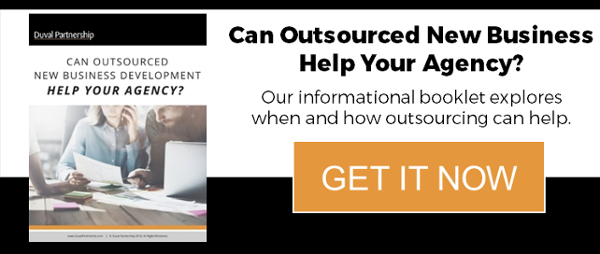Before the holiday, I shared some questions I often get from agency owners about new business. While writing that, it occurred to me that those questions — while important — aren’t necessarily the most critical ones. There are other questions that I don’t get, but which are essential to agency new business success. So, as a follow-up, here are three key questions that agency owners should be asking, but often aren’t.

Questions more agency owners should ask:
Is my approach to new business proactive or reactive?
Nobody thinks about this unless they come from a sales or business development background. It’s just not on their radar. So, what is the difference, and why does it matter?
Most agencies are primarily reactive in their approach to agency new business, which is, in part, why they struggle with new business efforts. Reactive is waiting for your website to generate leads. Reactive is waiting for your clients to give you more business and refer new accounts to you. With referrals being the leading source of new business for 90% of agencies (Hubspot), this should sound very familiar.
The problem is that not all business is good for your agency. When you take a reactive approach to new business, you get what you get, but not necessarily what you want. That can lead to frustration and wasted resources. You are more likely to find a better “fit” when you identify your ideal clients and take the initiative to go after them. It’s the difference between letting new business “happen to” your agency, and making it happen.
How do you take a proactive approach? First, you must identify which clients have been the best fit for your agency. That involves looking at which accounts have been the most profitable, who you did the best work for, who you most enjoyed working with, what work has been the best at generating future opportunities, and so forth. What do those clients look like? What about them facilitated a successful working relationship?
Next, think about which types of clients you have the best chance of acquiring considering things like your talent resources, reputation, competition, work to date and business results you have delivered. Starting from here, develop a profile for your new business targets. This may incorporate company size, geography, industry, fees, or other considerations. Be very focused and practical in creating this list.
Now, take that list of targets, and create a plan to get their attention. Who do you need to cultivate a relationship with at those companies to make them aware of your agency? What can you say that will get their attention? What value do you have to offer them? What have you done that they really need to know about?
There is a lot of research that goes into understanding what’s going on at your target company, anticipating what their pain points might be, and how to connect that to your agency’s resources and expertise in a way that might help you break through to them. With so much noise, your communication strategy must hit the right notes. We’ve written about a few considerations here and here. With that, commit to making a certain number of calls, emails, social media connections, and in-person connections each week to create new relationships with people at your target companies.
Can’t get through? Calendar to circle back. If you don’t connect and you don’t get a direct “no,” don’t give up. Continue to “touch” and educate the prospect using relevant content that your agency has created. On LinkedIn, be proactive in any business groups that your prospects may be a part of. There are many ways to go out and create relationships that will lead to a great match for your agency. When you purposefully seek out the new business you want, you can reject the business that you don’t.

Is my agency positioning on point?
People don’t ask this because they think their positioning is on point. That’s exactly why so many agencies have an issue with positioning; they can’t see how they present themselves from an outsider perspective, and they have a false sense of confidence. Why does it matter? The competition for agency new business is only increasing. In the overall landscape, the trend is less work for agencies, and what’s available is smaller in size and shorter in duration. Agencies can’t afford to miss opportunities because their website doesn’t effectively communicate their value.
Here’s how you can fix it: get more than one party to objectively review your positioning and website copy from an outsider perspective. And (here’s where a lot of people get it wrong) be sure that those parties are a) experts in agency branding; b) in a position to be brutally honest with you; and c) that you are able to incorporate their feedback without dismissing it. If any of those factors are missing, it defeats the purpose.
Have you already gone through those steps? Have there been changes since then that would require you to repeat the process? For example, have there been significant changes to your agency roster, collective skills and expertise, business targets, or current clients? How has your competition changed? A good rule of thumb: if it’s been more than a year, it’s time to revisit.
Here are some things that your brutally honest outside experts should hone in on:
- Is the agency positioning accurate and authentic?
- Is the agency positioning clear?
- Is the agency positioning unique and compelling?
- Does the website positioning communicate value and business results—not just cutting-edge creative?
Why do I need an agency new business process (and do I have one or not)?
Agencies tend to not have a defined new business process in place, and if they do, it’s not applied throughout the organization on an ongoing basis. It’s easy to make new business the purview of a new business team and then divorce the rest of the agency from the process. It’s also easy to just deal with everything as it comes on an ad hoc basis. So why should you care if you have a formal new business process?
The benefits of a repeatable new business process for your agency include:
- Better organization - With defined steps, everyone knows what is expected. This reduces the chance for opportunities to fall through the cracks. Particularly with a longer sales cycle, it is critical to stay in touch with prospects and nurture leads over time so you can close more new business.
- Stronger questioning strategy - The new business game is all about knowing what questions to ask and getting better at listening. This takes the “selling” out of the process and helps you deliver a stronger, more effective, prospect-oriented pitch.
- Disqualify the wrong leads faster - With a solid questioning strategy and a checklist of the qualities your target clients should have, you can stop wasting time on the wrong opportunities.
- Easier to track the sales team’s performance - With a structured process, it's easier to identify where your new business team is struggling. This allows you to make corrections with training before it hurts your bottom line.

If you aren’t sure whether your agency has a new business process, here’s how you can tell.
Some indicators of a successful new business process:
- Your new business plan and process are contained in written documents.
- Your entire agency is aware of your new business plan and process, and they know what steps to take when new opportunities present themselves.
- You have defined your ideal targets. (That requires you to know which of your clients are most and least profitable. It also requires you to know objectively what your agency does best and is competitive for).
- You have a list of specific questions and criteria to use with every prospect in order to qualify or disqualify them.
- You have devoted resources on an ongoing basis to defined new business activities. You also have target benchmarks for those activities (number of weekly emails, calls, etc.) and their results, which you regularly track and measure against, making adjustments as needed.
- You know not only how to pitch effectively, but also how to negotiate and close without undervaluing your agency.
- You know your agency’s win-rate, and you do a post-mortem on all lost pitches and lost accounts to determine what went wrong, where, and how changes can be made going forward.
- You have a lead nurturing program in place for prospects that may become opportunities in the future.
- You have a content marketing/thought leadership program that supports your new business lead generation efforts and is aligned with your agency’s business goals (types of new business targets and areas of expertise, etc.).
If you have a new business plan, a proactive approach, and strong positioning, your agency will have a strong new business foundation. Any one of these elements can mean the difference between new business success and failure. How do you rate your agency with respect to these three things?
Read more:
- Common Questions From Agency Owners About New Business
- How Agency New Business Has Changed in the Past 10 Years
- 9 Reasons Why Your Agency Isn’t Getting New Business
Image credits: © Canva



